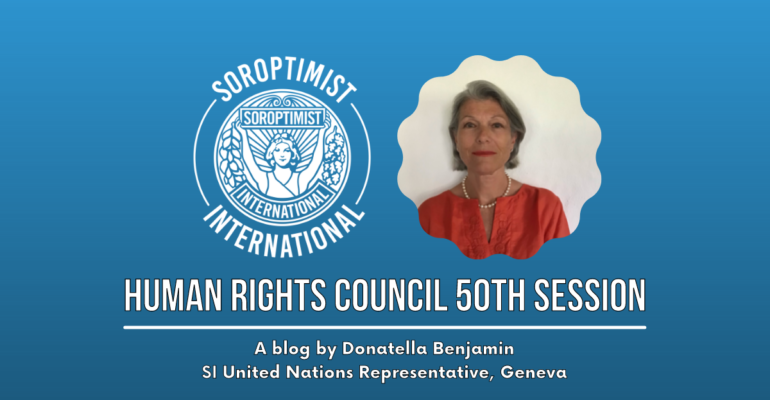During the Human Rights Council 50th Session, the annual full-day discussion on the human rights of women was held on June 27, 2022. Donatella Benjamin, SI UN Representative in Geneva, reports on the panel exploring the nexus between climate change and violence against women and girls (VAWG).
“In her opening statement Ms. Michelle Bachelet, UN High Commissioner for Human Rights, reminded that climate change threatens us all, but women and girls are the one who suffer most. Among the people displaced by climate crises 80 % are women and girls: they run greater risk of sexual violence, human trafficking, prostitution and early or child forced marriage [i].
Ms. Bachelet asked for urgent steps to be taken so that no one is left behind:
- acknowledging the link between VAWG and climate change,
- women and girls must be fully involved into the fight against climate change,
- States must enhance an accountability framework – no impunity for perpetrators of violence.
The High Commissioner added “We are in a race against time, let’s move from rhetoric to real action and recognise this is an urgent priority”.
The panelists were HR defenders, climate justice, environment and gender experts. Ms. Melania Chiponda (FEMNET) stressed that big corporations in mining and oil extraction, industrial agriculture and logging, are the ones who contribute most to climate change in Africa, neglecting local interests. Endangering their lives, women and girls step out of their traditional roles to defend their land and environment, and they need more protection and support.
Ms. Astrid Puentes Riano, independent consultant, reminded us that among 40 Million refugees in 2020, 30 Million had to leave their homes and lands because of climate crises and a majority were internally displaced in their own countries. Specific risks are faced by women and girls in shelters, camps and temporary settlements, like violence, trafficking, abduction, femicide and forced displacements.
Mr. Rajib Ghosal (Save the Children International) explained that women and girls account for more than 40% of agricultural work-force in the rural areas of the Asia-Pacific region; mostly unpaid, they do not appear in data, but are responsible for 6o% to 80% of local food production, in addition to taking care of children and the elderly. Due to climate change, women and girls must walk longer to access water, while insecurity and poverty lead to younger enforced marriages, or daughters sold in exchange for livestock.
Finally, Esmeralda, a 15 years-old girl advocate (MOLACNATS, Peru), explained that in her region agricultural production is replaced by mining industries causing toxic wastes, illegal logging, climate change. Women and girls, who are the ones who guarantee food and water, are targeted by criminal groups, go missing, leave school, suffer from macho-minded culture. Esmeralda asked for promoting gender equality in agriculture, guarantee same rights, safe spaces, education, participation in climate policies and, last but not least, new forms of masculinity: “Children are not only the future, we are also the present and part of the solution for change”.
Ms. Adriana Quinones, Director of UNWomen Geneva, speaking also on behalf of UNICEF and UNFPA, called on governments and stakeholders to
- create an enabling legal and policy environment for the elimination of VAWG, including environmental defenders, in the context of climate change;
- promote strategic, cross—sectoral partnerships at global, regional, national and local levels, including with local organisations led by women and girls;
- generate data and evidence on the impact of climate change on VAWG and risk factors;
- invest in flexible gender-responsive and adaptive approaches to violence prevention and special protection that build women ang girls’ resilience to climate-related shocks.
Ms Reem Alsalem, Special rapporteur on violence against women, its causes and consequences, closed the very rich discussions and thanked the many other speakers who contributed to the debate, sharing their experiences and promising practices of prevention of VAWG with bearings to climate crisis.”
[i] As an example, during recent events like Hurricane Katrina, the rate of rape in the region rose by 53%; after the last earthquake in Nepal, trafficking increased 4 folds (HRC).

